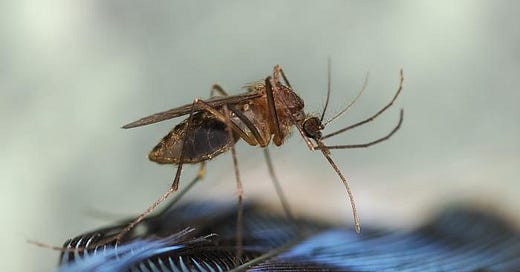The number of human Eastern equine encephalitis (EEE) virus disease cases in the United States has risen to seven, from five states.
Yesterday, Massachusetts state health officials reported the third EEE case of the year in a man in central Middlesex County.
As a result, EEE risk levels are being raised to high in Acton, Ayer, Boxborough, Carlisle, and Littleton in Middlesex County; and Harvard in Worcester County.
The following communities are being raised to moderate: Bedford, Billerica, Chelmsford, Concord, Framingham, Groton, Lincoln, Shirley, Stow, Tyngsborough, Wayland, and Westford in Middlesex County; and Berlin, Bolton, Clinton, and Lancaster in Worcester County.
“It is essential that residents continue to use mosquito repellent with an EPA-registered active ingredient every time they are outdoors. We also strongly recommend that residents and towns in areas at high risk for EEE reschedule their evening outdoor events to avoid peak mosquito biting hours,” said Public Health Commissioner Robbie Goldstein, MD, PhD.
There have been 88 EEE-positive mosquito samples in Massachusetts this year. While most activity has been focused in Plymouth and Worcester counties, infected mosquitoes have also been found in Bristol, Essex, and Middlesex counties.
“Mosquito behavior starts to change in September,” said State Epidemiologist Dr. Catherine Brown. “They will be less active during cooler temperatures. However, during periods of warmer weather, such as are being forecast for the end of next week, mosquitoes will be out and looking for their next meal.”
Other than Massachusetts, Vermont, New Hampshire, New Jersey and Wisconsin have reported human EEE cases.
Eastern equine encephalitis is a rare but severe illness spread by the bite of an infected mosquito.
Some people infected with eastern equine encephalitis virus never develop symptoms. Those who do become sick may develop a mild flu-like illness, and others may develop an encephalitic infection (an infection that involves swelling of the brain). The severity of illness usually depends on the age of the person and if they have underlying health problems. Eastern equine encephalitis can be very severe, and even fatal, especially in those older than 50 and younger than 15. About one-third of people who develop severe illness will die, and those who recover often have mild to severe brain damage. If you have had eastern equine encephalitis virus, you cannot get it again.
Alabama officials report two Eastern Equine Encephalitis (EEE) cases in horses
Florida Eastern Equine Encephalitis cases in horses this year top cases in all of 2023





